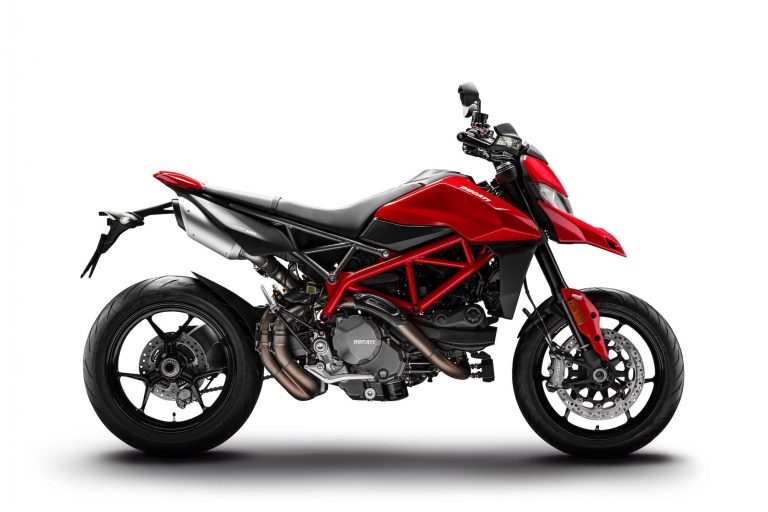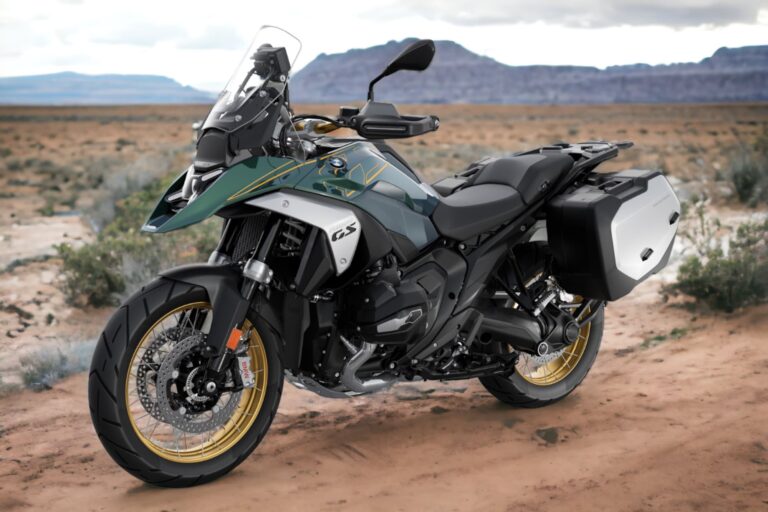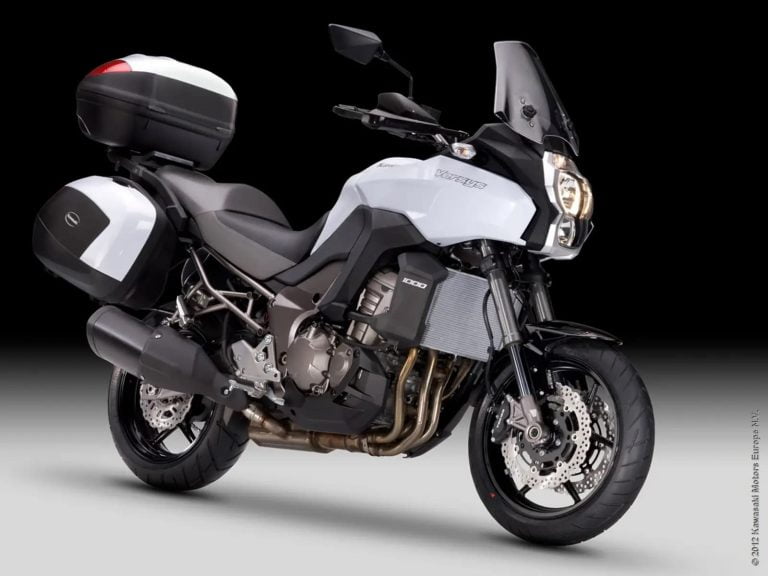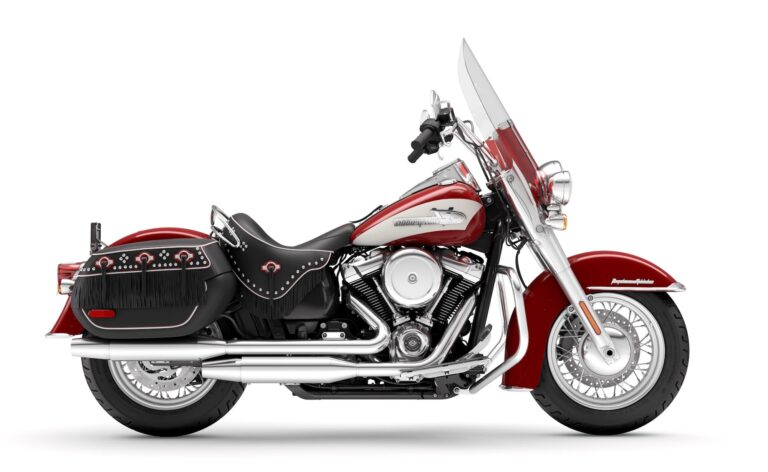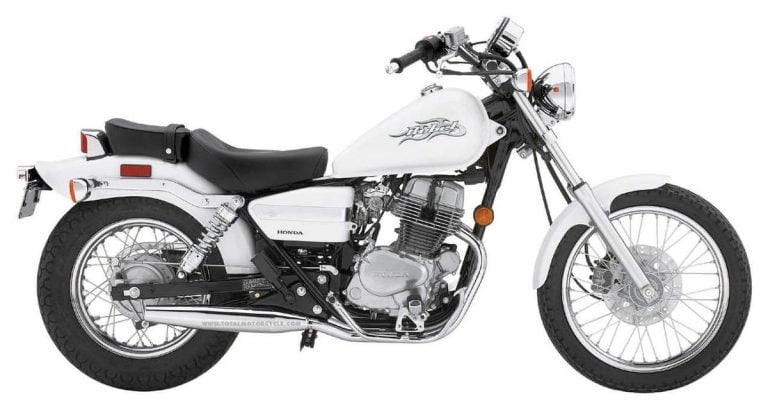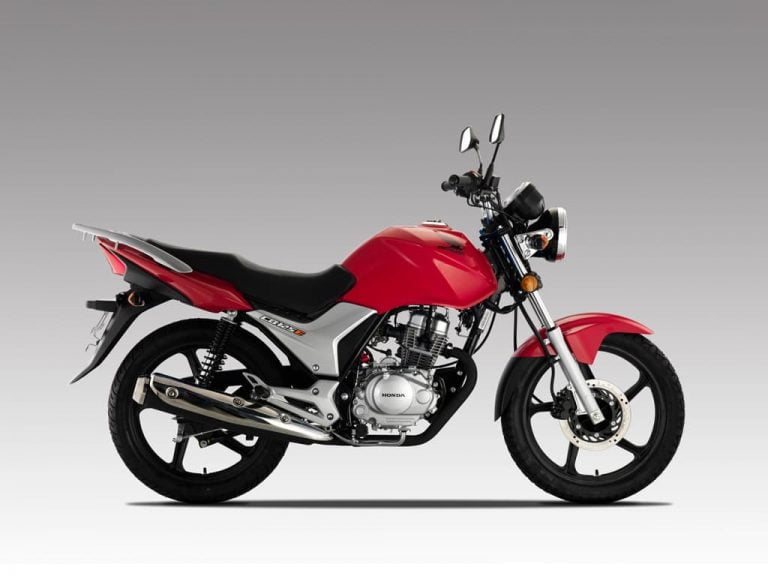Kawasaki KLR250 Maintenance Schedule and Service Intervals
This is the maintenance schedule with associated service intervals for Kawasaki KLR250.
The Kawasaki KLR250 is a dual-sport motorcycle, equally adept at on- and off-road riding, a little sibling to the indomitable Kawasaki KLR650. Kawasaki introduced the KLR250 in 1984, building it for over two decades until it was discontinued in 2005, and replaced by the Kawasaki KLX250S from 2006.
Updated December 2023 — incorrectly had referred to the engine as air-cooled in one segment.
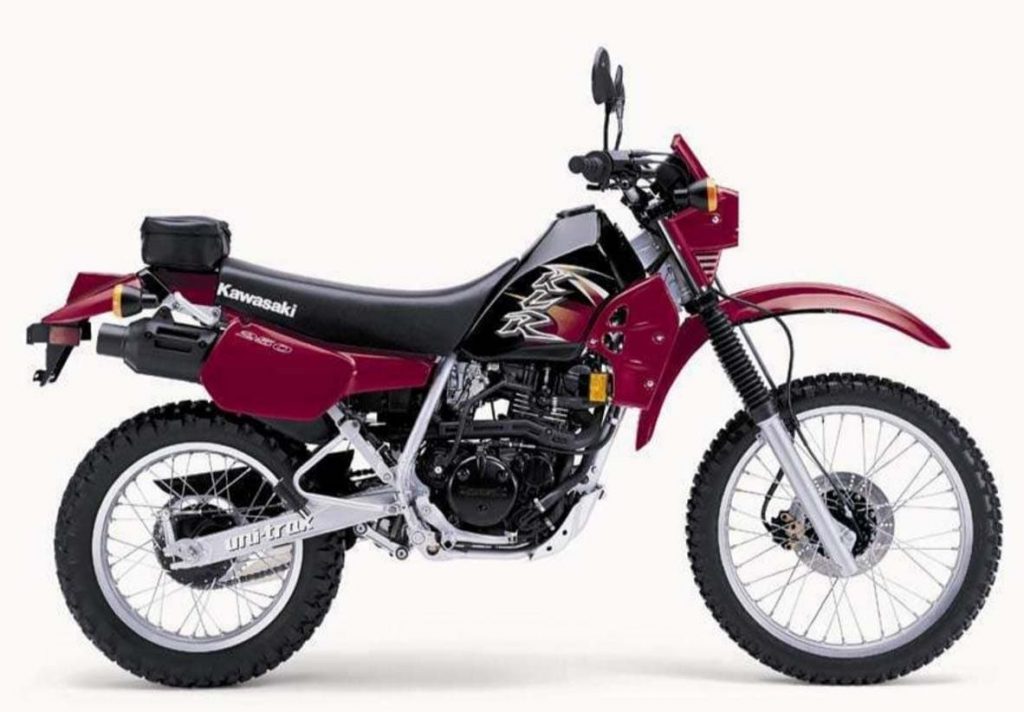
This site has links for things like oil and spark plugs from which we earn a commission (which unfortunately nobody can save, not even us). If you appreciate this work, then please use those links. Thanks!
Kawasaki KLR250 Service Intervals
The KLR250 has 3000 mile / 5000 km service intervals. While you only have to change the oil every 6000 miles / 10000 km, some owners change the oil at this interval too, particularly if riding off-road. However, it’s not required.
At every 3000 mile / 5000 km service, also check the spark plug and the valve clearances. The KLR250 has a 4-valve head so there are four clearances to check. However, the valves are a screw-and-locknut type, so can be done by the backyard mechanic with relative ease (though tightening the valve and keeping the clearance is fiddly, as always.
Since the KLR has a liquid-cooled engine, make sure you regularly change the coolant. Also, keep the brake fluid fresh, replacing it every couple of years.
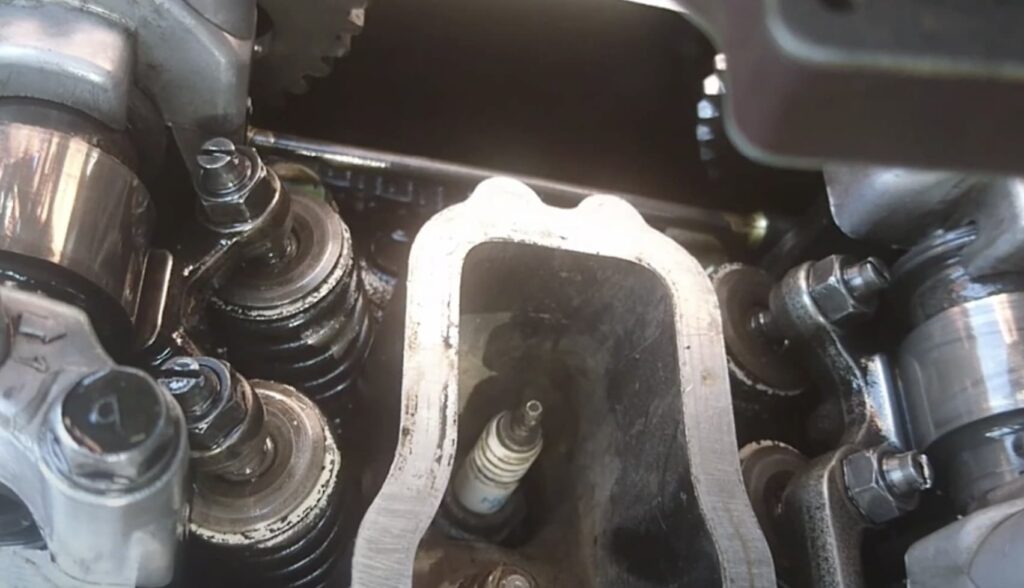
Maintenance Schedule for Kawasaki KLR250
Below is the maintenance schedule for the Kawasaki KLR250. It’s split into a regular annual service checklist, plus the list of intermittent maintenance items.
For higher odometer readings, repeat at the frequency interval established below, doing actions every 1, 2, 3, or 4 service intervals.
| mi x 1000 | 3 | 6 | 9 | 12 | 15 | 18 | |
|---|---|---|---|---|---|---|---|
| km x 1000 | 5 | 10 | 15 | 20 | 25 | 30 | Every |
| Annual inspection checklist (see below) — Perform | ✓ | ✓ | ✓ | ✓ | ✓ | ✓ | year |
| Engine oil — change (Kawasaki 10W-40 engine oil) | ✓ | ✓ | ✓ | year | |||
| Oil filter — replace (HF123) | ✓ | ✓ | ✓ | ||||
| Air cleaner element — clean | ✓ | ✓ | ✓ | ||||
| Air cleaner element — replace | ✓ | ✓ | ✓ | 5 cleanings | |||
| Spark plug — clean and gap, replace if necessary (NGK DP9EA-9) | ✓ | ✓ | ✓ | ✓ | ✓ | ✓ | |
| Valve clearance — check | ✓ | ✓ | ✓ | ✓ | ✓ | ✓ | |
| Fuel system — check | ✓ | ✓ | ✓ | ||||
| Cylinder head bolts — check | ✓ | ✓ | ✓ | ||||
| Brake fluid — change (Castrol DOT 4) | ✓ | 2 years | |||||
| Nuts, bolts, and fasteners — check | ✓ | ✓ | ✓ | ||||
| Radiator hoses, connections — check | ✓ | ✓ | ✓ | year | |||
| Swing arm pivot — lubricate | ✓ | ✓ | ✓ | ||||
| Brake camshaft — lubricate | ✓ | 2 years | |||||
| Steering stem bearing — lubricate | ✓ | 2 years | |||||
| Front fork oil — change | ✓ | ||||||
| Coolant — change (ethylene glycol pre-mix, e.g. Zerex G05) | ✓ | 2 years | |||||
| Caliper piston seal and dust seal — replace | 2 years | ||||||
| Master cylinder cup and dust seal — replace | 2 years | ||||||
| Brake hoses — replace | 4 years | ||||||
| Fuel hoses — replace | 4 years | ||||||
| Drive chain — lubricate (Motul chain paste) | 400 mi (600 km) | ||||||
| Drive chain slack — check Target 20-35 mm (0.8-1.4 in) | 600 mi (1000 km) |
Kawasaki KLR250 annual inspection checklist
| Kawasaki KLR250 Annual Inspection Checklist |
|---|
| Battery electrolyte level — check (every month when not riding) |
| Brake fluid level — check (pre-ride) |
| Drive chain wear — check |
| Spark arrester — clean |
| Idle speed — check |
| Throttle grip play — check |
| Evaporative emission control system — check (if fitted) |
| Brake play — check |
| Brake light switch — check |
| Brake lining wear — check |
| Brake hose connection — check |
| Fuel hose connection — check |
| Clutch — adjust |
| Steering play — check |
| Spoke tightness and rim runout — check |
| Tire wear — check |
| General Lubrication — perform |
Tire size and tire pressure for the Kawasaki KLR250
The Kawasaki KLR250 has a 21-17 tire combo. Stock it shipped with Dunlop trail tires, but you can fit anything that fits the following tire sizes.
| Wheel | Tire size | Tire pressure (cold) |
|---|---|---|
| Front | 3.00-21 4PR | 150 kPa/21 psi |
| Rear | 4.60-17 4PR | 150-175 kPa kPa/21-25 psi, depending on load |
About the Kawasaki KLR250
The KLR250 is a lightweight dual sport motorcycle, made with simple specs and intended to be used in a variety of conditions, ranging from road work to off-road, but not singularly focused on either.
It’s powered by a 249cc four-stroke, single-cylinder carburettor-fed liquid-cooled engine with dual overhead cams operating four valves per cylinder… its single cylinder, that is.
The engine produces a stomping 22.3 kW (30 hp) at the crank, and less than that at the rear wheel, at 8,500 rpm. And torque is 19 ft-lb (26 Nm) @ 7,500 rpm, but it comes on sooner — this isn’t an engine you have to rev up to have fun.
Power goes to the ground via a six-speed transmission and chain drive. In theory, you can ride the KLR250 above 100 km/h, and it’ll get there, but you will likely have the throttle near its limit.
Double engine counter-balancers keep the powerplant running smoothly from idle to redline, and an automatic cam chain tensioner helps maintain more precise cam timing with minimal maintenance.
Kawasaki made the KLR250’s frame from the same high-tensile steel used in Kawasaki’s world-class KX motocross machines. So even though this is a dual-sport motorcycle not intended to land massive jumps, the chassis is up to it (occasionally).
The KLR250 has an air-adjustable front fork and Kawasaki’s trademark UNI-TRAK rear suspension, with a good nine inches of travel at both ends to smooth the ride over rough surfaces. The rear suspension has both adjustable preload and rebound damping.
The KLR250 originally came with universal tires. These days they’d do well with trail or dual sport tires, whatever suits your riding conditions.
The KLR250 has a front disc and a rear drum.
Reference, Manual for the Kawasaki KLR250
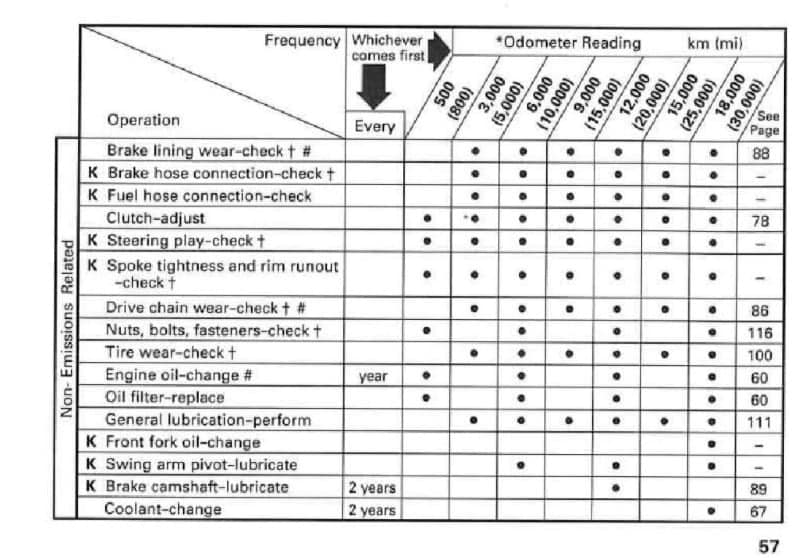
The above maintenance schedule comes directly from the user’s manual for the 2002-2005 Kawasaki KLR250, which is available here.
